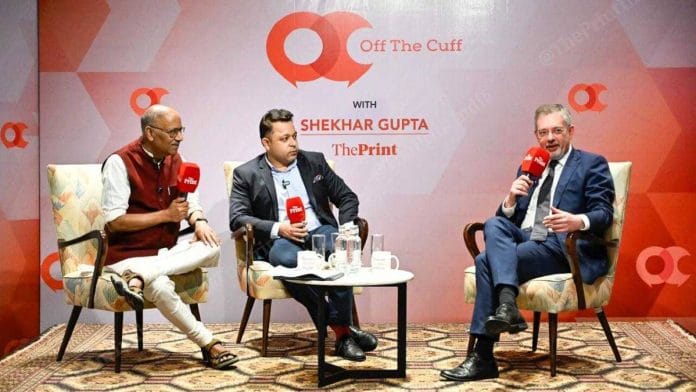New Delhi: Denis Alipov, Russia’s Ambassador to India, Tuesday defended Moscow’s ongoing war in Ukraine, insisting it was provoked by expansion of NATO and Western hostility towards Russia.
Speaking at ThePrint’s Off The Cuff event in Gurugram, Alipov argued that the conflict is less about territorial ambitions and more about protecting Russian-speaking populations and Russia’s “existential” security interests.
“Ukraine has been made a playground of the NATO and US against Russia. It’s not so much about Ukraine itself—it’s about the intentions of the West towards us,” Alipov said.
The North Atlantic Treaty Organization or NATO is a military and political alliance of countries from North America and Europe. It was established in 1949 and currently has 32 members.
The envoy went on to describe the 2014 Maidan uprising, which ousted then-Ukrainian President Viktor Yanukovych, as an “obvious coup” backed by western powers, claiming that Russia’s subsequent intervention was aimed at safeguarding civilians in eastern Ukraine.
He reiterated Moscow’s long-standing view that NATO poses an “existential threat” to Russia—not just militarily, but to its sovereignty and identity.
“Let me remind you—back in 2007, at the Munich Conference, when President Putin spoke about threats to our national security, nobody listened. His speech was met with suspicion and even laughter. It was simply dismissed,” he said.
“Since then, we have made many attempts and approaches to the West, raising concerns about NATO expansion and the threats we feel in Russia because of it—the threats from their actions in Ukraine. Nobody listened. But when we finally started to act—suddenly, everyone began to pay attention.”
“The idea of disintegrating Russia, of balkanising Russia, has been in Western minds for centuries,” the envoy added. “Ukraine is the core lever to do that.”
‘Russia’s goal not land but protection of rights’
Alipov accused Europe of perpetuating the war through what he called “belligerence and childish behaviour”, asserting that the European Union continues to “believe there is a chance to have an upper hand” despite what he portrayed was a lost cause for Kyiv and its backers.
He claimed that US President Donald Trump’s return to office has brought “a more genuine” approach to US-Russia relations, contrasting it with what he described as the previous Biden administration’s “disruption of dialogue”.
“With the Trump administration in power now, we have a more genuine approach towards the US-Russia relationship,” Alipov said. “It seems now the Americans are prepared not only to listen to us, but also to hear.”
When pressed on when the war might end, Alipov maintained that Russia’s goal “has never been about land” but about “the protection of the legitimate human rights” of Russian-origin populations in eastern Ukraine. However, he acknowledged that the territories annexed by Moscow are now enshrined in Russian law and “will not be given away”.
“Had we had a peaceful process starting back in 2022, those territories would have remained with Ukraine,” he said. “But not any longer. And Ukraine will lose more and more land if it continues the conflict.”
Alipov dismissed western portrayal of Russia as a threat to Europe as “sinister” and “factually twisted”, insisting instead that Moscow was the one under threat. “We have never threatened Europe,” he said. “It is NATO that threatens us.”
He also warned that Russia’s nuclear doctrine allows for the use of such weapons in the event of an existential threat, calling European insistence on “defeating” Russia “crazy” and “unprofessional”.
He also went on to reject accusations that Moscow targets civilians or children in Ukraine. Responding to a question about drone strikes at a kindergarten school, Alipov said Russia “has never targeted civilian infrastructure”, blaming Kyiv for attacks on Russian border regions.
He alleged that Ukrainian forces had killed “hundreds of children” in Donbas before 2022.
Addressing claims of abducted Ukrainian children, Alipov said they had been “temporarily evacuated” from conflict zones for safety, calling western reports of kidnapping and indoctrination “outrageous propaganda” and insisting that Russia’s actions were “humanitarian, not coercive”.
Looking ahead, Alipov said that Europe’s security cannot be achieved without dialogue with Russia.
“From the beginning, we kept trying to convince the Europeans, the US and the new authorities in Kyiv that we should sit down, talk, and find a peaceful solution to the contradictions and conflicts in eastern Ukraine—always peacefully, at the table. All those attempts were rejected,” he said.
“Europe will never be secure with an unsecure Russia as its neighbour and vice versa,” he said. “There is only one way: to sit and agree on a mutual security architecture.”
(Edited by Nida Fatima Siddiqui)







